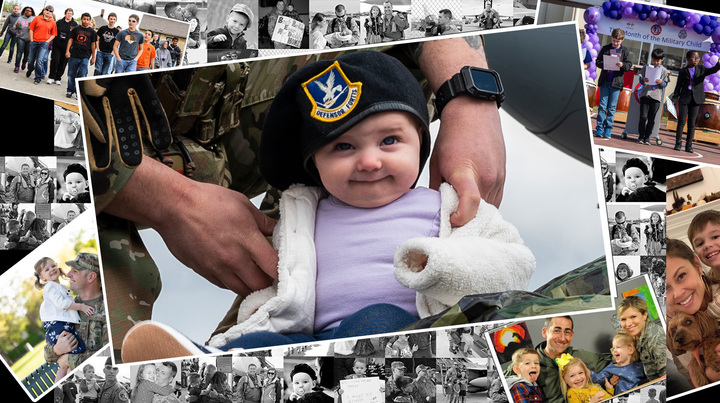

Do you know where the term “Military Brat” comes from? Or even the word “brat”?
Researchers told the Department of Defense that we might not have the word “Brat” at all without military families, and specifically the kids of long-ago British Army soldiers.
The term “British Regiment Attached Traveler,” according to the research, was assigned to families who traveled with a British soldier in pre-World War I duty, often noted with the acronym “BRAT.”

Grace Clifton, a professor at Open University in the U.K. told the DOD that the term “barrack rat” was also used in the U.K. in the 1900s when discussing the lives of children in army barracks.
In her research, Clifton also came across a reference in a satirical play called “The Recruiting Officer,” published in 1707. In it, George Farquhar has a song about soldier life: “We all shall lead more happy Lives, By getting rid of Brats and Wives, That scold and brawl both Night and Day; Over the Hills and far away.”
National Defense University researchers told the DOD that they were able to trace “Army brat” to 1942 when it appeared in “The War Dictionary,” a publication on military slang. The book defined the term in relation to Arm officer children as a term of endearment.
Despite these theories, NDU researchers said that there’s no definitive indication of where the term originally surfaced. Many traditional etymological sources, like the Oxford English Dictionary, trace “brat” usage to at least the 1500s in languages like Irish and Scottish.
But regardless of the name’s origins, the Pentagon is celebrating “military brats” in April as the “Month of the Military Child.” Officials are making social media posts and asking former ‘brats’ to share their stories — including some now in high profile spots.
From Seven Schools to Reality TV
Vanessa Lachey is a well-known actress who embraces her identity as a former “military brat.” Now the lead actress on the hit-CBS show NCIS: Hawaii and a global ambassador for the United Service Organization, Task & Purpose talked to Lachey about the importance of a month recognizing kids growing up the same way she did.
“While our parents, I commend them for doing what they do and giving their service to other people to our country and to our freedom, the military child does not have that choice but willingly, bravely and lovingly takes on that responsibility and continues that as they get older,” she told Task & Purpose after a virtual USO event.
Subscribe to Task & Purpose today. Get the latest military news and culture in your inbox daily.
Lachey was born in 1980 on Clark Air Force Base in the Philippines. She attended seven different schools, living in California, Nevada, Florida, Germany, Japan, and South Carolina. In 1986, her parents divorced but her new step-father was also in the Air Force. Lachey moved with her mother to his assignment at Incirlik Air Force Base, Turkey.
She remembers the fears few of her civilian friends could understand — and that her children today do not face.
“Every time the doorbell rings, they run to the door. Who is it? Who’s here? Do we have a delivery in that? Amazon? Is it pizza? Is it a friend?,” Lachey said about her children. “Every time the doorbell rang when I was a child, I did not want to answer it because I was afraid it was bad news. That is a fear that I don’t know that people understand that your parents may not come home when you kiss them goodbye.”

She also said her “brat” childhood taught her to value her time now with her own three children, she said.
“I treat every moment with such intensity and purpose and intention,” Lachey said. “I am driving them to school right now because I wouldn’t want to miss this moment to drop them off and say, ‘I love you. We’ll see you later.’ It’s literally ingrained into my DNA.”
Struggles of military ‘brats’
According to the Department of Defense, there are more than 1.6 million military children around the world.
The lifestyle of military children is far from typical. “Brats” are used to packing up their lives every few years with their parents to follow new orders across the U.S. and to foreign bases around the world.
In a typical military childhood, a kid can expect to change schools six to nine times by the time they graduate from high school, according to research by two daughters of an Air Force vet titled, “What Becomes of America’s Military Brats?”
Military brats also struggle with their service member parents going away on deployment or temporary duty assignments, TDYs.
“Emerging evidence suggests that military children struggle with more mental health and behavioral problems than their civilian counterparts, particularly at times of deployment,” the daughters’ research said.
A joint Yale University, Mayo Clinic, and University of Connecticut study in the Journal of the American Academy of Child and Adolescent Psychiatry reported that while children of veterans may have socioeconomic advantages like higher income, health insurance, and married caregivers, they also have higher rates of behavioral disorders like attention deficit hyperactivity disorder, or ADHD, and conduct problems.
“Military and veteran children also take care of loved ones who are wounded, ill, or injured — and far too many grow up with the unbearable pain of losing a parent,” President Joe Biden wrote in an April 2024 proclamation recognizing the month. “It is a solemn reminder that being a military child means sacrificing for our country without ever wearing a uniform.”
The latest on Task & Purpose
- Former Army base warns of grenades on local trails
- ‘Black Hawk Down’ Ranger veteran awarded Silver Star
- The Air Force’s new $60 million Special Warfare center honors a fallen pararescueman
- Former Air National Guardsman may have defected to Russia
- Marine battalion commander fired for “loss of trust and confidence”
